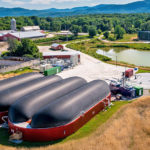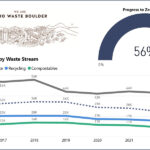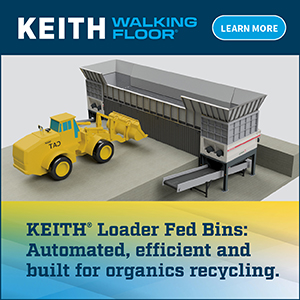Top: Z-Best Composting Facility in Gilroy, California. Its certified organic compost, which is sold to farmers, is registered as an agricultural mineral in California, which allows Z-Best to make nutrient claims. Photo courtesy of Zanker Recycling
Ron Alexander
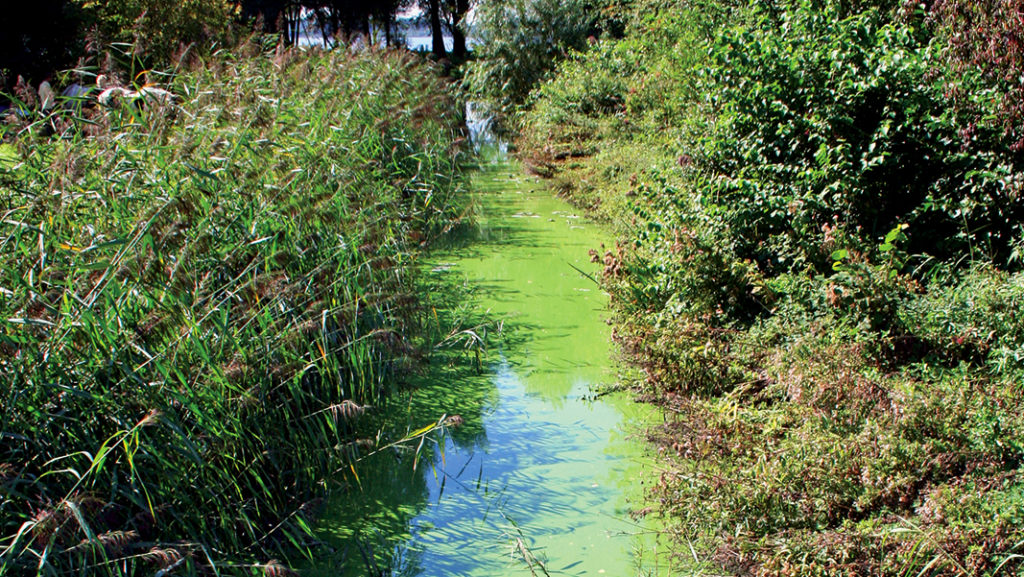
Excess amounts of phosphate can cause algae blooms to occur. Inorganic forms of phosphate pose the greatest risk to water quality. ©iStockphoto.com/Sloot
Many people within the organics recycling industry — especially composters and biosolids management companies — as well as farmers and turf managers, are familiar with the concern regarding the over application of phosphorus and/or the migration of phosphorus into our water resources. Obviously, this issue should be taken seriously so we can protect drinking water, reduce surface water contamination (eutrification), and conserve an important nutrient required for plant growth (and food production). That stated, organic forms of phosphorus (P), such as in compost and biosolids (and certain manures), contain low levels of water extractable phosphate (WEP), but increasingly are regulated like inorganic P sources. For background, see “Phosphorus And Compost Use Dynamics” (BioCycle, 2016).
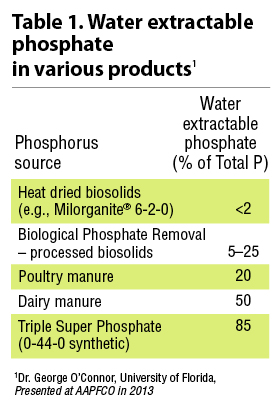 In the 1990s, the manure water extractability test method was developed by Penn State University (PSU) to better measure the water soluble P in manures. Since then, the method has been refined and used by the SERA-17 (Southern Extension and Research Activity) organization as a means to mitigate potential water quality impairment. The biosolids industry has used this same method to better understand the solubility of P in its products (Table 1). Even more recently, Dr. Geoff Kuter of Agresource, Inc. (a Massachusetts compost brokerage firm) evaluated a series of compost products at PSU’s laboratory using the SERA-17 test method and determined that the amount of phosphate in compost that is water extractable is low in comparison to the total phosphate in the product. The water extractable WEP ranges from about 2% to 22% of the total P in compost.
In the 1990s, the manure water extractability test method was developed by Penn State University (PSU) to better measure the water soluble P in manures. Since then, the method has been refined and used by the SERA-17 (Southern Extension and Research Activity) organization as a means to mitigate potential water quality impairment. The biosolids industry has used this same method to better understand the solubility of P in its products (Table 1). Even more recently, Dr. Geoff Kuter of Agresource, Inc. (a Massachusetts compost brokerage firm) evaluated a series of compost products at PSU’s laboratory using the SERA-17 test method and determined that the amount of phosphate in compost that is water extractable is low in comparison to the total phosphate in the product. The water extractable WEP ranges from about 2% to 22% of the total P in compost.
Regulatory Impacts
While most commercial phosphate fertilizers (inorganic) supply P in the form of orthophosphoric acid (orthophosphate) — which is water soluble (highly water extractable phosphate) — compost and most other carbon-based products possess only a small fraction of orthophosphate (and other soluble forms of phosphate). As such, the majority of phosphate in our recycled organics products are bound to organic matter and are provided in a slowly releasing form. Understanding this fact, and teaching it to our customers (which includes the ability to make appropriate labeling claims), is necessary to avoid misuse of our recycled products, as well as the inorganic forms of phosphate applied along with it. It will allow end users to grow their ornamental plants, turf and food crops without adversely affecting the environment.
It is important to note that 16 states have enacted phosphate fertilizer restrictions for landscape and home turf, and all states are suppose to oversee nutrient management planning in agriculture. However, most states are not differentiating the type of phosphate being utilized, which could assist them to better hone the implementation of their regulation, improving soil health — and protecting the environment. Every state has an official who is a member of the Association of American Plant Food Control Officials (AAPFCO). This Association is the gateway to instituting national changes in practices like test methods.
Call To Action
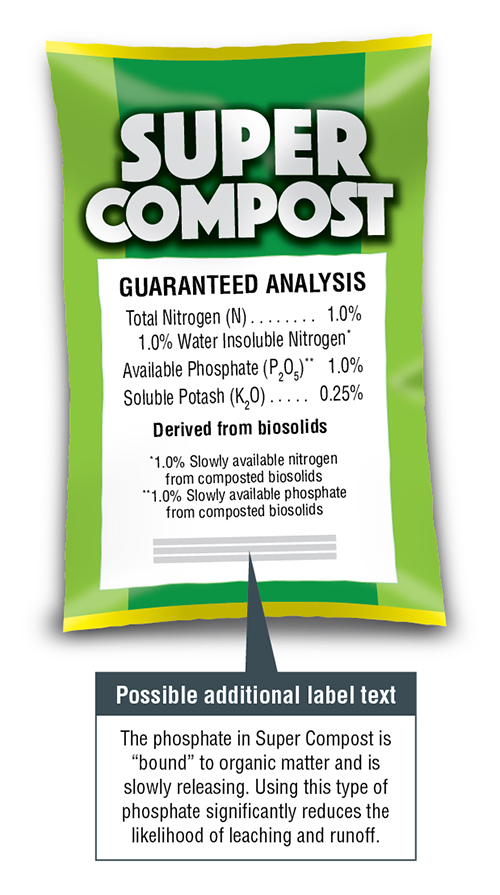 A push has been underway, sponsored by the US Composting Council (USCC), to promote the acceptance of the SERA-17 water extractable phosphate test method as a means to measure slowly releasing phosphate in compost and other carbon-rich products. The USCC has also promoted the allowance of slowly releasing phosphate claims on related product labels (example illustrated in graphic). And the Council has a representative who attends and participates in the AAPFCO meetings.
A push has been underway, sponsored by the US Composting Council (USCC), to promote the acceptance of the SERA-17 water extractable phosphate test method as a means to measure slowly releasing phosphate in compost and other carbon-rich products. The USCC has also promoted the allowance of slowly releasing phosphate claims on related product labels (example illustrated in graphic). And the Council has a representative who attends and participates in the AAPFCO meetings.
We need the composting and organics recycling industry to support our initiative to accept the SERA-17 WEP test and allowance for claims on product labels. Please contact Ron Alexander before June 15, 2021. Letters of support from the industry-at-large are critical to illustrate to AAPFCO that there is support for our initiative.
Ron Alexander is president of R. Alexander Associates, Inc. (Apex, North Carolina, 919-367-8350), a company specializing in product and market development for organic recycled products. He is author of ‘The Practical Guide to Compost Marketing and Sales’ (2nd Edition published by BioCycle) and has over 35 years of experience in compost and organic recycled product marketing. Mr. Alexander is a member of the US Composting Council’s Seal of Testing Assurance (Program) Advisory Committee and is an Industry Liaison to AAPFCO (Association of American Plant Food Control Officials).



